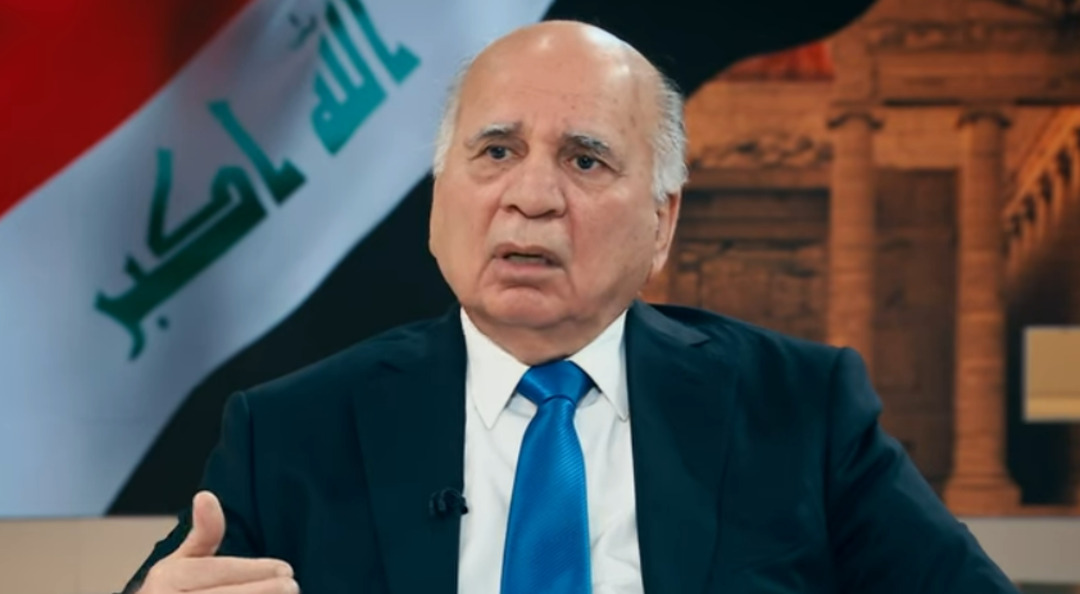-
Fouad Hussein to Shams TV: Iraq Rejects the “Unity of Fronts”… Our Sovereignty Is Iraqi, and Dialogue — Not Violence — Is the Solution

In an exclusive interview with Shams TV, Iraqi Foreign Minister Dr. Fouad Hussein addressed key issues in the Middle East and beyond, focusing in particular on Iraq and the Kurdistan Region.
Speaking with journalist Elie Nakouzi, Hussein emphasized that Iraq has managed to avoid being drawn into the regional war thanks to the government’s strong relations with a variety of international partners.
When asked how he convinced the Iraqi government to stay out of the conflict, Hussein pointed to two main factors: internal dialogue and active engagement with the outside world.
He highlighted Iraq’s communication with the West, particularly the United States, to influence Israel not to expand the war, stressing: “Iraq does not want to be part of the battlefield. When others spoke about the ‘unity of fronts,’ we said only one thing: we have one front, and that is the Iraqi front.”
Hussein underlined that disarming factions, whether in Lebanon or Iraq, cannot be achieved through violence, as that would inevitably lead to internal conflict. Instead, he argued that the best path forward is rational dialogue and national consensus to preserve stability and prevent civil strife.
On the Popular Mobilization Forces (PMF) and the issue of disarmament, Hussein stated that the U.S. position on the PMF law and the armed factions is clear. He added that decisions must be guided by Iraq’s real interests, insisting on a single national authority for the country’s military and security institutions. Weapons outside this framework, he said, should be addressed through national dialogue aimed at protecting the country and ensuring social stability.
Regarding Iran’s influence in Iraq, Hussein rejected the notion that Iran “rules” Iraq, but acknowledged Tehran’s considerable impact on certain Iraqi decisions. He noted that Iraq’s sovereignty had eroded over time—first under UN sanctions after 1991, and later after the 2003 international intervention—creating an ongoing sovereignty crisis. Restoring it, he argued, requires building institutions and strengthening political authority, a process that began with the 2003 constitution.
He further explained that Iraq’s neighbors interfere directly or indirectly in its affairs, with Iran exerting the greatest influence among them. On the recent visit of Iranian Supreme National Security Council Secretary Ali Larijani to Iraq, Hussein said the trip had been planned since he took office. He dismissed speculation about hidden messages, emphasizing that the talks focused on strengthening bilateral relations and keeping the region away from conflict.
Hussein also addressed Iran’s nuclear program, saying part of the regional tension is tied to this issue. He noted that Western powers have reached a consensus that Iran must not acquire nuclear weapons. The challenge, he said, is not in allowing uranium enrichment for peaceful purposes but in ensuring it does not cross into weapons production.
On the presence of international coalition forces in Iraq, Hussein reiterated that they were invited by the government to help in the fight against ISIS. Any discussion of their future role, he said, must be guided solely by Iraq’s security needs and not by outside pressures.
Turning to the Kurds, Hussein stressed that they have long struggled for democracy, believing that the Kurdish question can only be resolved within a federal framework that ensures power-sharing and participation in decision-making. He explained that federalism, enshrined in Iraq’s constitution, means the fair distribution of authority and resources between the center and the regions. The real challenge, he added, lies in the contradiction between Baghdad’s centralist culture and the federal principle.
Hussein insisted that the upcoming budget law must include a clear allocation for the Kurdistan Regional Government, to be transferred directly from the federal government, as the KRG is accountable to its people.
Finally, on Iraq’s next parliamentary elections, Hussein said the Kurdistan Democratic Party is assessing the political landscape and will seek alliances with forces that support its vision of federalism, democracy, and transparent relations between Baghdad and Erbil.
You May Also Like
Popular Posts
Caricature
opinion
Report
ads
Newsletter
Subscribe to our mailing list to get the new updates!






















